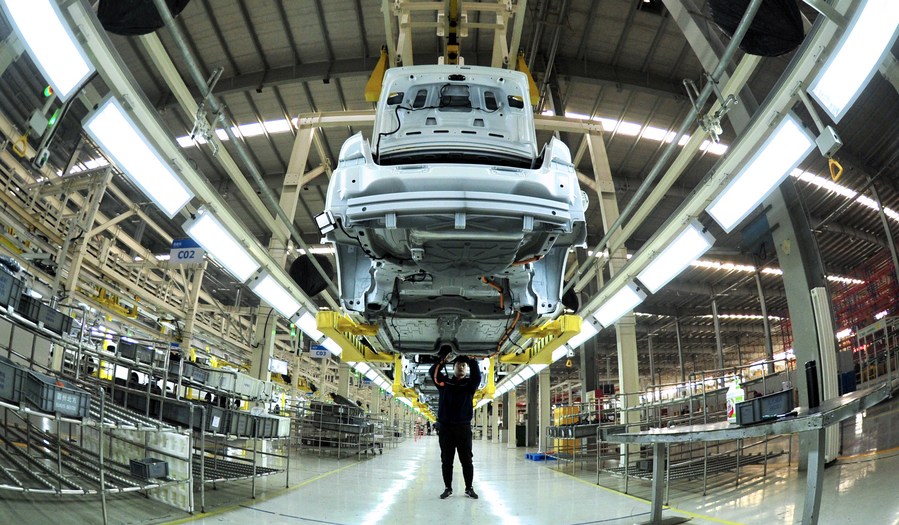
Aerial photo taken on Aug. 2, 2017 shows the Red Beach scenic area in Panjin, northeast China's Liaoning Province. (Xinhua)
Over the next five years, more formidable yet necessary reforms are expected. The new five-year plan will chart a clear path toward reaching these goals, as the country has done previously.
by Xinhua writer Wu Xia
BEIJING, Oct. 29 (Xinhua) -- While analysts at home and abroad are closely following the ongoing fifth plenary session of the 19th Communist Party of China Central Committee for clues about China's economic and social direction for the next five years and beyond, they can be confident in the strategic continuity of China's policy design and elements of certainty the nation can inject into a turbulent world.
At the key meeting, the proposals of China's 14th Five-Year Plan (2021-2025) for economic and social development are being discussed, before a detailed plan is tabled to be approved next March by the National People's Congress, China's top legislature.
The Chinese government sets economic and social priorities every five years. These five-year plans have been a hallmark of China's macro policy-making for economic development and social management, and a proven instrument to ensure the fast and stable growth of the world's most populous nation.
Launched in the mid-1950s, the first five-year plan helped China build its industrial capacity almost from scratch. Now, as it is finishing the 13th such plan, China has become the world's second largest economy, and is close to completing the building of a moderately prosperous society in all respects.
China's steady and dynamic economic growth has allowed the country to be a stable propeller for global economic development. According to official data, China has ranked first in terms of contribution to global economic growth since 2006, and has contributed about 30 percent to global growth annually since 2013.

An employee works at the general assembly workshop of Huanghua company of BAIC Motor Co., Ltd, in Huanghua, north China's Hebei Province, Dec. 21, 2019. (Xinhua/Mu Yu)
With an effective response to the COVID-19 pandemic, China is the first major economy to return to growth since the coronavirus shock, and is expected to remain as the only economy with positive growth in 2020. China's rapid economic recovery offers confidence and opportunities for the world economy to get back on track.
The magic of China's five-year plans lies in its continuity. Sticking to a national blueprint enables China to deliver on longer-term economic and social goals that seem unreachable in some Western countries where long-range policies can barely survive.
Poverty reduction, for example, is a national program spanning decades. Since the 1980s, the Chinese government has rolled out plans to reduce poverty, making it a national development priority.
By the end of 2019, the number of Chinese citizens living in poverty fell to 5.51 million from 98.99 million in 2012. China is on course to eradicate extreme poverty by 2020, which will make the country the first in the world to end absolute poverty.

Villagers sort out mushrooms inside a storehouse at Meichi Village of Xichuan County in Nanyang, central China's Henan Province, Feb. 19, 2020. (Xinhua/Feng Dapeng)
The making and implementation of five-year plans also provide China an institutional framework to pursue gradual and tough reforms over time while maintaining stability and achieving remarkable growth.
Since the start of reform and opening up in 1978, the five-year plans over the decades have facilitated the transition from a planned economy to a market one, from export-driven growth toward a more consumption-based one, and from focusing on economic growth to a more comprehensive approach that incorporates ambitious social and environmental targets.
Over the next five years, more formidable yet necessary reforms are expected. The new five-year plan will chart a clear path toward reaching these goals, as the country has done previously.
In a time of turbulence with varied, unprecedented global challenges, China will stick to its long-term development goals against all odds. With the whole world craving certainties, this is particularly comforting. ■



